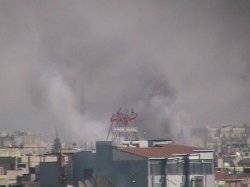Dozens dead in Syrian city after kidnappings
06/12/2011| IslamWeb
More than 60 bodies have been taken to hospitals in the central Syrian city of Homs following a series of kidnappings that began on Sunday, activists have said.
Activists and residents of several neighborhoods said on Monday that Sunni residents had been kidnapped by state-backed Alawi militias known as "shabiha".
The renewed violence in Homs, reportedly one of the bloodiest days since widespread anti-Assad protests began in March, came as the Syrian government responded positively to an Arab League plan to send human rights observers to the country.
President Bashar al-Assad and the ruling elite are mostly Alawi, a sect of Shia Islam, while the majority of the country is Sunni. Protests against Assad that began in March have escalated into an armed conflict between the government and its militias on one side and civilians and defected soldiers on the other.
An activist in the Zahraa district told the London-based Syrian Observatory for Human Rights that shabiba had kidnapped and killed at least 34 people from districts of Homs known to oppose Assad.
The "majority" of the city's neighbourhoods were "bombarded heavily" beginning early on Monday morning, the observatory said.
Agreement or more negotiations ?
It was unclear whether the Syrian foreign ministry's "positive" response to the Arab League plan amounted to an acceptance of the bloc's proposals to defuse the country's eight-month crisis.
A spokesman for Walid al-Moallem, Syria's foreign minister, said he had "responded positively" to the league demand, which was backed by the threat of sanctions, and sent a letter to the organisation's chief, Nabil Elaraby, on Sunday night.
Al Jazeera's Nisreen Al Shamayleh, reporting from neighbouring Jordan, said the Arab League had received correspondence from Moallem.
"In it, Syria accepts that the Arab League sends observers to monitor the situation on the ground in Syria," she said.
"However, a source at the Arab League told Al Jazeera that although the letter contained positive notes to build upon, it stops short of saying that the Syrian response was an outright acceptance."
Arab leaders had given Syria a deadline of Sunday to respond to the league's plan, which calls for the admission of observers to ensure compliance with a government ceasefire.
They also held out the threat of pushing for UN involvement if Damascus continued to resist international mediation efforts.
Syria announced it had conducted wide military maneuvers over the weekend in an apparent show of force as Bashar al-Assad, the president, defied pressures over the deadly crackdown on opponents.
The 22-member Arab League did not immediately react to Syria's announcement.
Syria sets 'conditions'
Al Jazeera's Rula Amin in Beirut, the capital of neighboring Lebanon, said the Syrians want "some changes" and that they were "more diplomatic" in the way they were seeking them.
"They say they agreed to the protocol in principle [but] they want the measures that the Arab League took against Syria to be reversed," she said.
"They want suspension of Syria's membership in the Arab League to be cancelled so that Syria becomes an active member again and they want economic sanctions that were imposed on Syria to be reversed as well.
"This is very important for the regime ... They want to alleviate some of the suffering that they have already been feeling because of the Arab League pressure on Syria."
While Arab League monitors want to have full access, Syrian officials insist the protocol that was presented to them undermines Syrian sovereignty, said our correspondent.
"They want to make sure there're no foreign monitors among those monitors - just Arab human rights activists and lawyers, and they don't want the media to accompany the monitors and I think there's a difference also on the number of monitors," she said.
Raft of sanctions
Syria's failure to meet an initial November 25 deadline to allow in observers drew Arab League sanctions, including a ban on dealings with the country's central bank.
Together with sanctions from the US, the EU and Turkey, the Arab League's penalties are expected to inflict significant damage on Syria's economy and may undercut the regime's authority.
Some sanctions - the central bank ban, a halt to Arab government funding of projects in Syria and a freeze of Syrian government assets - went into effect immediately.
Also, an Arab meeting in Qatar on Saturday, approved a list of 19 Syrian officials subject to a travel ban.
Among them are Assad's younger brother Maher, who is believed to be in command of much of the crackdown, as well as cabinet ministers, intelligence chiefs and security officers. The list does not include the president himself.
Earlier on Monday, Syria's state-run media said Syrian military war games over the weekend included test-firing of missiles and air force and ground troop operations "similar to a real battle".
State TV said the exercise was meant to test "the capabilities and the readiness of missile systems to respond to any possible aggression".
The drill showed Syrian missiles and troops were "ready to defend the nation and deter anyone who dares to endanger its security" and that the missiles hit their test targets with precision, the state TV said.
PHOTO CAPTION
Smoke rises from the city of Homs December 4, 2011.
Aljazeera

